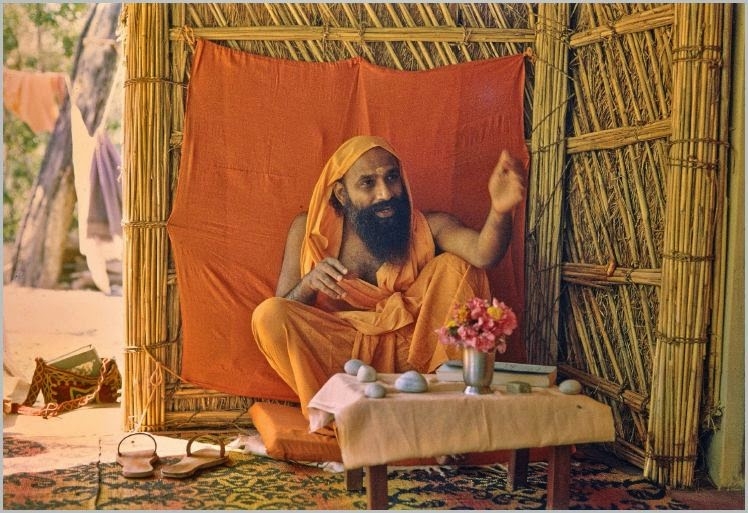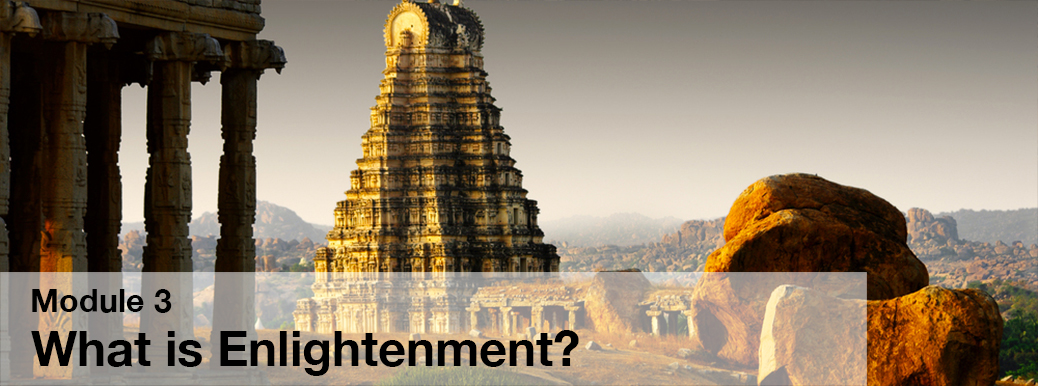Introduction
Whenever we start a new project in life, we have to be clear what our end goal is. If the goal is not defined clearly then we do not make the right decisions and cannot track our progress. Failure is certain when the goal is not clear.
Similarly, before we start the study of Vedanta, we have to be certain what we are trying to accomplish. It seems in this case our goal is clear.
We want enlightenment, isn’t it? Freedom from the sense of limitation and bondage.
But on looking closely we find that our goal might not be so clear after all. That is because each one of us has a slightly different notion of enlightenment.
So before we start with Vedanta, it would be a good idea to understand what enlightenment actually is, to see how Vedanta defines enlightenment.
Only then can we understand the teachings as they are meant to be understood and not let our own ideas of enlightenment interpret the teachings incorrectly.
Is Enlightenment an Experience?
Most of the time enlightenment is defined as “an experience”, “an event” that permanently changes an individual, dissolving the ego, making him or her permanently blissful and happy (Nirvana). Different types of concentration or meditation techniques are prescribed to achieve this experience or event or state.
Some people on experiencing these kinds of epiphanies or Samadhis, once or twice, immediately declare themselves enlightened.
But this notion of experiential enlightenment does not hold up to logic. All experiences are in time, i.e. temporary, so Nirvana can never become a permanent experience.
The one constant fact of the world of experience is change. There is no special category or type of experience that does not change. The experiencer, me, is in time and the objects of experience including states of mind (Nirvana), are in time. Two things that are constantly changing (i.e, me and the objects I experience) cannot produce a state of mind that does not change.
I know that I am a limited. If I were limitless, I would not be seeking enlightenment as I would not be limited by my suffering. It is precisely because I feel limited that I am seeking freedom. How can an action (concentration, meditation or any other action) by a limited entity produce a limitless result? Freedom is limitless and cannot be the result of any action.
An epiphany or Samadhi happens when the mind becomes particularly still and Awareness reflects in it. Why the mind goes into such a mode nobody knows. Just as one cannot generate anger at will, similarly generating epiphanies is not in anybody’s control. Even experienced meditators cannot generate such experiences at will, though such experiences happen more frequently to people who do spiritual practice (but not always).
Reality is Non-Dual
The experiential view that enlightenment is a special experience than what I am experiencing right now is based on the the idea that reality is a duality.
Vedanta says that reality is non-dual Awareness. This seems contrary to our perception since we experience reality as duality.
Duality means that I take the “apparent” distinction between me and the world to be a “real” distinction. However when I inquire into the nature of reality through Vedanta’s methodology, it becomes clear that this apparent duality is because of false perception, and that life is actually non-dual. Nothing is separate from me.
Because of this false perception of reality the experiential notion of enlightenment seems more attractive to us.
The Path of Knowledge
If that is the case, do I want a special experience?
I want the special experience of oneness because I don’t know what Awareness, the Self, is. I don’t know who I am. Therefore if I want to be free of the limitations and sufferings imposed on me by this world, I should seek to understand the true nature of reality, the Self, which is in fact my innermost nature.
When am I not experiencing myself?
There’s never not a time that I am not experiencing myself because the Self, Consciousness, is all there is. Therefore if I want enlightenment i.e. the freedom from the sense of limitation and bondage, then I need to get rid of the belief that I am separate from the objects I experience. I don’t have an experience problem, I have a knowledge problem.
Hence the path of knowledge.
Action Cannot Give You Enlightenment
The spiritual paths that present enlightenment as an experience, an event, try to get you to generate a union with Consciousness by doing certain actions. But if I am already Consciousness then I can’t do anything to get what I’ve already got.
Actions are only useful to obtain something I do not have.
How can I get myself?
How can I obtain what I already have?
So this problem of limitation can only be solved through understanding. Actions are not going to produce enlightenment.
Self-Inquiry and Vedanta
Vedanta offers a sophisticated methodology to reveal the Self. This method, which will be explained thoroughly in the course, is called Self-Inquiry.
Vedanta is not opposed to experience. It does not say experience is bad, and only knowledge is good. It only says that you need to properly understand the relationship between the two. And you need to understand the limitations of experience.
When this is done, a great obstacle to enlightenment is dismissed.
From the point of view of Consciousness, the Self, there is no difference between knowledge and experience.
I Am Already Free
Let’s investigate the theory of experiential enlightenment from the point of view of the non dual nature of reality.
If there is only one Self and it is everything that is, then everything I experience at any time or place can only be the Self including me, the experiencer. In short, I am experiencing Awareness because I am Awareness. And because Awareness is limitless it is always free. And because there is only Awareness, I am already free. I do not need an experience to set me free. Therefore, the attempt to get a discrete experience of the Self is gratuitous, like going out for a hamburger when you have a filet mignon in the refrigerator.
James Swartz
The Real and the Apparent Self
As we will learn further ahead in the course, one of the most important aspects of Self-Inquiry is the discrimination between the “real” and the “apparent” self.
The mind/ego (the apparent self) wants to be free of this limited, suffering, body. But it cannot get free because it is already free of the body. The desire to be free is very difficult to give up because what it needs to be free of seems to be very real. But it is not real.
When I sleep at night, I experience limitlessness. When I wake up in the morning, I feel limited again. How do I know this? The body does not tell me. I, as Awareness, knows both limitlessness and limitation.
The cause of bondage, of suffering, is the identification with experience, the experiencer and the instruments of experience, brought on by lack of Self knowledge.
When it is clear that I am the knower of the experiencer, and this knowledge is assimilated one-hundred percent, I become free.
Q&A with Swami Dayananda

Swami Dayananda
Swami Dayananda: It is not an experience to be gained; you have enough experience of yourself. I am saying you are never away from yourself; you are not something to be gained as a new experience. You are already there, seeing me, hearing me. You never go out of the experience of yourself.
You are there experiencing yourself in every experience. You are never outside yourself. You never get lost. Everything else, any object, may get lost, but you, the subject, never gets lost. Therefore, there is no question of lack of experience. In fact, you are the essence of every experience.
I analyse your experiences about yourself and point out that this is what you are. Therefore there is no question about gaining an experience of Atma (Self), I, because Atma is the invariable in all experiences. It is not that I must experience myself; it is that I recognize myself in all experiences.
I see what I am – in seeing, hearing, walking, talking, thinking, doubting. In all of them what is there is only myself. There is only One and that One is I. To see that One is recognition. There is no experience. Experience is only with reference to an object other than yourself.
Questioner: Perhaps I was confusing the issue because I was not clear.
Swami Dayananda: We are confused and therefore we use wrong words. We use wrong words and therefore we are confused. When we use right words there is no problem. If I use the word “experience” for knowing myself, I will be confused. Let us stop using that word; knowing myself is a question of self recognition.
So what you are asking is, “Is there such a thing as clear knowledge?”. Yes. In fact knowledge must be clear. Knowledge is not gradual, but clarity is gradual. Clarity is gradual because I keep creating doubts.
In preparing the mind for self recognition there are things that can be done to have a quiet mind. That quiet mind is experiential. So you may say that experientially you first obtain a quiet mind. That is useful, because without a quiet mind, the teaching does not work.
Questioner: So breathing exercises ….
Swami Dayananda: Everything like that is experiential.
Questioner: But they are useful?
Swami Dayananda: Everything including Asana, Pranayama, Pratyahara is useful. It all depends upon what you want. They are useful to gain a quiet mind. But if you think these practices are going to solve the problem of knowing yourself, that is not true.
Conclusion
This chapter may have seemed too “intellectual”. If you’re new to Vedanta you probably would’ve never encountered such emphasis on the knowledge aspect of enlightenment. In fact enlightenment is only knowledge since ignorance is the cause of our suffering.
We cannot overstress the importance of this chapter. A wrong notion of enlightenment can be the biggest stumbling path on the path to Self-Realization. So if something is not clear, read again.
Even if you’re not ready to accept some things which have been said here, it’s okay. It’s enough for now that you just understand it. Having doubts is a normal part of Self-Inquiry. These doubts will get cleared when you understand the whole vision of Vedanta.


